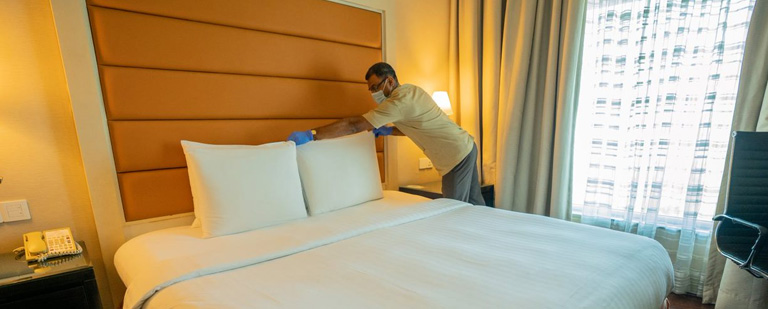By Mr. Rajneesh Malhotra, VP – Operations and Asset Management
The hospitality industry, which has adapted to the “new normal” with seriousness and grace, is gradually reviving its operations as state governments remove restrictions. As businesses gear up to reopen, evolving guest preferences will play a significant role in shaping the overall hospitality and travel experience. Impacted by the travel restrictions and lockdown since mid – March, hoteliers are embracing fresh ideas and inspiration to cater to ever-changing consumer behavior and perceptions. While safety continues to be of prime importance, the industry is also faced with a gamut of challenges pertaining to developing a more personalized and engaging guest experience with minimum human contact.
The ongoing battle against the pandemic has triggered several changes in in the hospitality industry, it has also made it critical for hoteliers to adopt practices and technology that will instill confidence in guests. Contactless & touch-less service are the new buzzwords and digital solutions are being implemented across hotels to minimize the chances of spreading the infection and reassure guests & employees. However, hoteliers need to minutely plan & implement these solutions without lowering the service delivery levels. The hotels need to be ahead of the curve and adopt the latest technologies and enhance service delivery levels in this ever-so-fast-changing landscape.
Many established hotels which were operating even during the lockdown period already had advanced sanitization measures in place. At Chalet Hotels too, we have implemented robust measures with globally accepted safety standards to reinforce our commitment to safety and enhance guest confidence. We are leveraging customer centric technology to enable contactless communication between our guests and employees to provide the same seamless, secure and safe experience as they come back to stay with us.
We are in the process of implementing keyless mobile check-in option where guests in all our hotels can directly walk to their allotted room and can open the door by using keyless mobile check-in app. Guests will also be able to view and sign registration card and guest folio on the iPad screen through our digital check-in facility. Our hotels have introduced “VSERVE” which allows fully contactless services by digitalizing E-Menu & E-Ordering using QR code, Room directory, TV guide, IRD, spa booking, laundry pickup, concierge services, welcome letter and hotel info along with an integrated digital payment wherever it is required. This is an ongoing initiative in all the Marriott properties.
Our brand partners Marriott and Accor, both follow global hygiene and sanitization protocols and continuously explore and implement new technologies that enhances guest experience keeping hygiene and safety in mind.
Even as the change is here to stay and the post-COVID-19 landscape demands hoteliers to incorporate changes on multiple fronts, the travel and hospitality industry can seek hope in the fact that sooner or later people will want to travel, within or outside their cities. We are cognizant of the consumers’ need to ‘get away’ and keeping this in mind our hotels have fine-tuned their offerings right from Staycations to F&B to business events and weddings.
Today, many hotels are reimagining their approach to demonstrate an all new hospitality experience as well as special offers in response to current consumer trends. For instance, our hotels in Bangalore and Hyderabad have witnessed weddings, as one of the key drivers of business. All government protocols regarding social distancing and hygiene are strictly followed in our hotels and our guests notice the measures adopted by our hotels to ensure the safety of our guests and associates. We provide online streaming tools so that people, who could not attend the function can join remotely and be a part of the celebrations. Similarly, in Maharashtra, our hotels the J.W Marriot Sahar & Renaissance Mumbai Convention Centre Hotel in Powai were functional for special purpose groups since the beginning of the lockdown. Apart from the rooms, we have leveraged F&B as an opportunity for revenue performance improvement with a forward thinking and creative mindset through our special culinary offerings.
In the future, it will be extremely crucial for hoteliers to continuously monitor the trends and be prepared to move swiftly at the pace of changing consumer needs. We work with global brands like Marriott and Accor who are updated with the latest developments concerning new solutions, guests’ preferences, changing trends, etc. and this gives our hotels an advantage of adopting the latest and superior solutions well ahead of others thereby helping our hotels deliver best in class services to the customers while ensuring highest possible standards of hygiene and safety.



